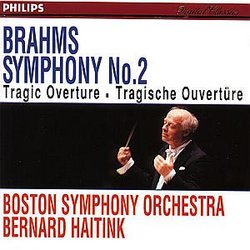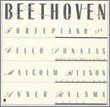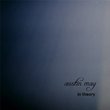| All Artists: Brahms, Haitink, Bso Title: Symphony 2 / Tragic Overture Members Wishing: 0 Total Copies: 0 Label: Polygram Records Release Date: 9/15/1992 Genre: Classical Style: Symphonies Number of Discs: 1 SwapaCD Credits: 1 UPC: 028943209427 |
Search - Brahms, Haitink, Bso :: Symphony 2 / Tragic Overture
 | Brahms, Haitink, Bso Symphony 2 / Tragic Overture Genre: Classical
|
Larger Image |
CD DetailsSimilar CDs
|
CD ReviewsSplendid Brahms 2nd Symphony Courtesy of Haitink and Boston John Kwok | New York, NY USA | 08/31/2008 (5 out of 5 stars) "I am surprised Philips has yet to reissue Bernard Haitink's early 1990s Brahms symphony cycle with the Boston Symphony Orchestra. It remains one of the most compelling cycles I have heard, only surpassed by his late London Symphony Orchestra cycle for LSO Live primarily for sound quality reasons. However, that cycle doesn't have the rich, quite glowing, ambient sound of Boston's Symphony Hall. Nor does it have two of the most exciting accounts I have heard yet of Brahms' 1st and 4th symphonies; to this list I most certainly must add Haitink's riveting interpretation of the Brahms 2nd Symphony. While Haitink would choose slightly brisker tempi with the London Symphony Orchestra, his Boston Symphony Orchestra recording seems a bit more relaxed, taking a leisurely approach to this piece. Without question, this is an interpretation that works, especially in the opening (Allegro non troppo) and closing (Allegro con spirito) movements; one that emphasizes superb intonation from the Boston Symphony's winds and brass juxtaposed against a sumptuously rich warm tone from the strings. Indeed, rarely have I heard the Boston Symphony sound better, except for several Carnegie Hall concert performances with Haitink conducting, most notably an exquisite account of this very work which I heard back in the Spring of 2001. Recorded at the same time as the symphony (3/1990), Haitink leads the orchestra in an equally commendable account of the Tragic Overture. While others may regard celebrated recordings from the likes of Abbado, Bernstein and Karajan, among others, as far more commendable, those who wish to hear this overlooked superb interpretation will find themselves richly rewarded." Brahms, Boston, And Haitink (Part 2) Erik North | San Gabriel, CA USA | 04/15/2007 (5 out of 5 stars) "Even now, it is astonishing to realize that it took Johannes Brahms some two decades just to complete his First Symphony, because of his fear of being unable to measure up to Beethoven in the symphonic genre. Even more astonishing is the fact that, in 1877, one year after finally finishing that first symphony, Brahms quickly completed his Second Symphony. Though this D Major work is less stormy than its immediate predecessor, and larger in orchestration (tubas are introduced into the mix, along with trombones), it is no less dramatic or heroic, just structured differently. Notably, part of the melody of the first movement of the symphony bears a striking similarity to the piece we all know as "Wiegenlied", or the Brahms Lullaby.
The companion piece here is Brahms' highly charged Tragic Overture, in the same key (D Minor) as that of his First Piano Concerto. A companion piece to the far brighter Academic Festival Overture from the same year (1880), it is not a work that has any particular tragedy in mind (though when asked about both works, the composer remarked: "One laughs; the other one weeps"). Both the Second Symphony and the Tragic Overture are given great performances here by the Boston Symphony under the great conductor Bernard Haitink, who had also recorded both works as part of his 1970s Brahms cycle with the Concertgebouw Orchestra of Amsterdam. The only two noticeable differences between these Boston recordings and those with the Concertgebouw are in Haitink's decision to repeat the first movement exposition of the Symphony (thus extending the movement to 21 minutes, and the entire symphony to 45 minutes in all) and a slower tempo on the Tragic Overture. But as with his recording of the Brahms 1st with this orchestra, Haitink and the Boston Symphony bring out the best in both of these works, which are among the best of their kind in the repertoire. A highly recommended recording." |

 Track Listings (5) - Disc #1
Track Listings (5) - Disc #1


